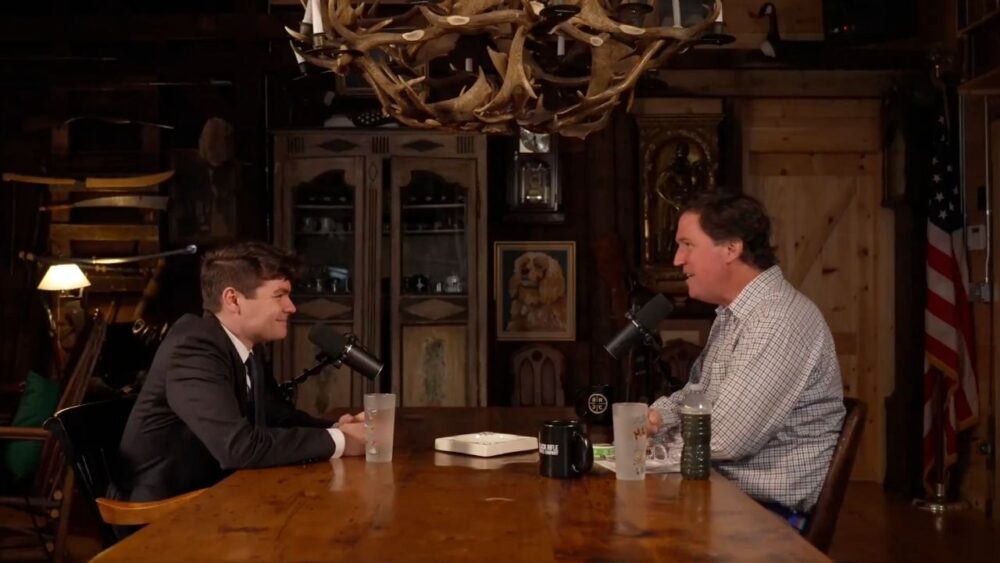Tucker Carlson’s recent interview with Nick Fuentes has ignited fierce debate across the political right, testing the movement’s long-standing commitment to open dialogue and free expression.
The hour-long interview aired on X and received over 15 million views, ranking among Carlson’s most-watched interviews since launching his independent platform. The conversation covered topics such as Fuentes’s early life, identity politics, political violence, pornography, and feminism.
Some commentators praised Carlson for hosting a challenging and open discussion, while others condemned him for allegedly “mainstreaming extremism.”
Opinions Split Over Free Speech
The interview’s reach highlighted a growing divide on the political right — between those defending open dialogue and those seeking tighter limits on who should be included in public debate.
The advocacy group StopAntisemitism criticized the interview in a post on X, stating, “.@CNN platforming Anna Kasparian. @TPUSA refusing to cut Tucker Carlson. This is how the Holocaust started: Jew hatred, normalized.”
Commentator Dinesh D’Souza posted alleged private messages with Turning Point USA founder Charlie Kirk, claiming Kirk called Fuentes “vermin” and opposed debating him. “One can only imagine what Charlie would say about Tucker’s butt-licking interview with Fuentes,” D’Souza added.
Calls for Censorship and Pushback
As criticism spread, some urged that Carlson and others who engage with Fuentes be ostracized or deplatformed. Free-speech advocates quickly pushed back.
“The problem isn’t ‘platforming.’ It’s promotion,” wrote Seth Dillon, CEO of The Babylon Bee. “You can share your platform — if you’re fortunate enough to have one — with anyone, but not everyone should be promoted from it.”
In response to commentator Dave Rubin’s suggestion that Fuentes be excluded from major platforms, Steven Crowder’s company replied, “By making sure Nick Fuentes can’t go on shows? If you disagree with him then defeat his ideas, it is the only way.”
The HodgeTwins echoed libertarian podcaster Dave Smith, saying open conversations like these benefit both the movement and the principle of free speech.
Meanwhile, YouTuber Liberal Hivemind criticized Carlson’s detractors. “WHAT THE F***, @TheOfficerTatum? Tucker Carlson should be ostracized from public forums? Who do you think you are?” he wrote on X.
Heritage Foundation Responds
The debate widened after Heritage Foundation President Kevin Roberts released a video Thursday addressing speculation that his organization was distancing itself from Tucker Carlson. In the video, Roberts affirmed Carlson as a “close friend” and defended his right to ask difficult questions.
“Christians can criticize Israel without being antisemitic,” Roberts said, adding that his “loyalty as a Christian and as an American is to Christ first and to America always.” He said Heritage’s mission is not to “cancel our own people or police the consciences of Christians,” asserting that the organization “will always defend our friends against the slander of bad actors who serve someone else’s agenda.”
Roberts said he “disagrees with and even abhors things that Nick Fuentes says” but argued that he should not be canceled. His remarks drew praise from America First commentators and criticism from pro-Israel voices such as Arsen Ostrovsky, who accused Heritage of enabling hate speech.
Broader Implications
The controversy highlights a deepening tension among the political right over how to balance ideological purity with open dialogue. Some right-leaning commentators say far-left political circles often enforce rigid conformity of thought, while those on the right traditionally claim to champion open debate.
Leftist commentators such as Ana Kasparian have criticized that rigidity.
“Some of the people that I’ve associated myself with because I thought they were the good people, they definitely have stereotypes in their head and are totally blind to the fact that they have those stereotypes and go around accusing others of being bad actors when they themselves need to do the work,” Kasparian said, according to Fox News.
The reaction underscored a widening divide on the political right — between those who say free speech requires tolerating even controversial voices and those who argue that giving a platform to fringe figures risks normalizing extremism.


